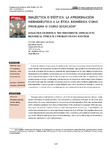Mostrar o rexistro simple do ítem
Dialéctica o erística: la aproximación hermenéutica a la ética biomédica como problema o como solución
| dc.contributor.author | Vergara, Óscar | |
| dc.date.accessioned | 2024-01-11T17:20:32Z | |
| dc.date.available | 2024-01-11T17:20:32Z | |
| dc.date.issued | 2019 | |
| dc.identifier.citation | VERGARA LACALLE, O., 2021. Dialéctica de la esperanza en pacientes con pronóstico de vida limitado. Aspectos éticos y narrativos. Cuadernos de bioética, vol. 32, no. 104, ISSN 1132-1989, 2386-3773. | es_ES |
| dc.identifier.issn | 1132-1989 | |
| dc.identifier.uri | http://hdl.handle.net/2183/34842 | |
| dc.description.abstract | [Resumen]: El presente trabajo se dirige a poner de manifiesto las condiciones en que la aproximación hermenéutica puede efectuar una insustituible aportación a la ética biomédica. Esta aportación se entiende a la luz de una de las principales deficiencias que presentan las metodologías al uso (en este trabajo nos referiremos básicamente al principialismo y al casuismo), que, en el fondo, actúan como meras cadenas de transmisión de los prejuicios del agente moral. Si bien los prejuicios no se pueden evitar, esto no significa que no se puedan superar, si es que, con Gadamer, entendemos que la comprensión está de algún modo dirigida a la verdad de las cosas. Este postulado nos permite poner en conexión la hermenéutica gadameriana con la ética aristotélica —cosa que ya hace el propio Gadamer, pero sólo a los efectos de deslindar su noción de comprensión—, e intentar ofrecer una salida para la mencionada deficiencia de las metodologías al uso. | es_ES |
| dc.description.abstract | [Abstract] : This paper aims to highlight the conditions in which the hermeneutical approach can make an irreplaceable contribution to biomedical ethics. This contribution is understood in the light of one of the main shortcomings of current methodologies (in this work we will refer basically to Principlism and Casuistics), which ultimately operate as mere chains of transmission of the moral agent’s prejudges. Although prejudices cannot be avoided, however, it does not mean that they cannot be overcome, if, with Gadamer, we realize that understanding is in some way directed towards the truth of things. This postulate allows us to connect Gadamerian Hermeneutics with Aristotelian Ethics —something which Gadamer himself does, but only to the effects of defining his notion of understanding— and to try to offer a way out for the aforementioned weakness of current methodologies. | es_ES |
| dc.description.sponsorship | Este resultado forma parte del Proyecto de Investigación «El discurso de los bioderechos. Bases filosóficas y jurídicas para su fundamentación, caracterización y aplicación» (DER2014-52811-P), dirigido por José Antonio Seoane y financiado por el Ministerio de Economía y Competitividad. | es_ES |
| dc.language.iso | spa | es_ES |
| dc.relation | info:eu-repo/grantAgreement/MINECO/Plan Estatal de Investigación Científica y Técnica y de Innovación 2013-2016/DER2014-52811-P/ES/EL DISCURSO DE LOS BIODERECHOS: BASES FILOSOFICAS Y JURIDICAS PARA SU FUNDAMENTACION, CARACTERIZACION Y APLICACION | es_ES |
| dc.relation.uri | https://doi.org/10.30444/CB.27 | es_ES |
| dc.rights | Licencia Creative Commons Reconocimiento-NoComercial-SinObraDerivada 4.0 Internacional | es_ES |
| dc.subject | Principialismo | es_ES |
| dc.subject | Casuismo | es_ES |
| dc.subject | Toma de decisiones | es_ES |
| dc.subject | Hermenéutica | es_ES |
| dc.subject | Principlism | es_ES |
| dc.subject | Casuistry | es_ES |
| dc.subject | Decision taking | es_ES |
| dc.subject | Hermeneutics | es_ES |
| dc.title | Dialéctica o erística: la aproximación hermenéutica a la ética biomédica como problema o como solución | es_ES |
| dc.title.alternative | Dialectics or Eristics: the Hermeneutic Approach to Biomedical Ethics as a Problem or as a Solution | es_ES |
| dc.type | info:eu-repo/semantics/article | es_ES |
| dc.rights.access | info:eu-repo/semantics/openAccess | es_ES |
| UDC.journalTitle | Cuadernos de Bioética | es_ES |
| UDC.volume | 30 | es_ES |
| UDC.issue | 99 | es_ES |
| UDC.startPage | 125 | es_ES |
| UDC.endPage | 134 | es_ES |
| dc.identifier.doi | 10.30444/CB.27 |
Ficheiros no ítem
Este ítem aparece na(s) seguinte(s) colección(s)
-
GI-FCR - Artigos [33]






